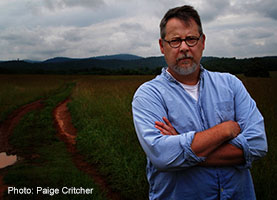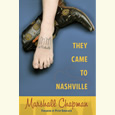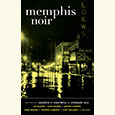Hurricanes, Despair, and Hope
In John Gregory Brown’s latest novel, Katrina isn’t what ruins a New Orleans man’s life
Even before Hurricane Katrina, Henry Garrett was a mess. Now, stranded in Virginia, he must choose whether to give in to his demons or face his own challenges. In A Thousand Miles from Nowhere, novelist John Gregory Brown uses the aftermath of the hurricane as a lens through which to examine the possibility of human redemption.
 Escaping New Orleans, Henry drives without purpose for days, finally stopping at a small motel in rural Virginia owned by Latangi, an Indian woman. Latangi refuses his money and invites him to stay as long as he wants: “You have lost everything, yes?” she asks.
Escaping New Orleans, Henry drives without purpose for days, finally stopping at a small motel in rural Virginia owned by Latangi, an Indian woman. Latangi refuses his money and invites him to stay as long as he wants: “You have lost everything, yes?” she asks.
It’s a fair assumption to make of a refugee from New Orleans, but Henry had lost almost everything long before the hurricane hit. A man in his forties who is still trying to understand his father’s abandonment and his mother’s bizarre response to it, Henry quit his teaching job after his mother’s death and bought an abandoned grocery store where the homeless gather and artisans sell their work, a career change that cost him his marriage:
He had squandered not only his job and his marriage but his entire life, reinventing himself by means of erasure, summoning thin air, as it were, from substance. He’d had everything and then, poof, in a magician’s cloud of manufactured smoke, he had nothing. He hadn’t exactly understood at first that this was what he was up to, couldn’t have explained it even to himself. But the hurricane had merely completed the job, had hurled him forward so that finally, lo and behold, he no longer recognized a single thing about his life.
Henry is pondering his next move when a freak event forces him to stay in Virginia: as he’s driving, a prisoner on a work detail hurls himself in front of Henry’s car. This tragedy, combined with the never-ending horrors being broadcast out of New Orleans, could be enough to send anyone into a suicidal downslide. Instead, even beset by demons, Henry begins to discover a faint glimmer that there might be purpose and hope for him yet.
A brief plot summary doesn’t begin to describe the textured delights of this novel. Brown shifts back and forth in time through Henry’s life until readers have sympathy for him and also for the people he has hurt. And Henry’s renewal is conveyed through both the mysterious and concrete. It comes in the form of a poem, the life work of Latangi’s late husband. It comes in the form of Marge, a force of nature in a red Mustang. It comes in the form of the widow and grandson of the man who died on the road. It comes in the form of the suffering Henry sees each day on his television.
All of these people have suffered, but they have also persevered. As Rusty Campbell, doctor turned realtor, tells Henry about his own battle with alcohol, “Well, the help I needed was losing every goddamn thing I ever had.” These sorts of battles, whether with alcohol or depression, rarely have complete victories. But they are still worth fighting. And this is what Henry has to learn.
Henry’s depression works as a kind of microcosm for the misery in New Orleans, with each detail weighing upon the next as readers are reminded with heavy-hearted disbelief of what actually happened in an American city of the twenty-first century:
But the melancholy and despair, the clatter and chaos, swept over him now and again, particularly when he spent too much time watching the television, keeping track of what was happening in New Orleans—the city emptying out bit by bit until virtually nothing and no one remained except the giant piles of debris and the uprooted trees and dangling wires, the muddy, oil-and-shit-smeared streets and the gun-toting soldiers spread out across the Quarter and the Garden District in search of disoriented stragglers, of looters, of the forgotten. In search of the dead. Worst of all were these grim discoveries, dozens who had been left behind in hospitals and nursing homes and halfway houses, young mothers who had drowned cradling their newborn babies in their arms, the sick or the elderly or disabled who’d died in their beds. It was not clear if their caretakers had abandoned them of it they had died as well.
A Thousand Miles from Nowhere is a beautiful novel about loss and redemption. Salvation does not come in the form of a psychotic killer or a Bible salesman who steals legs, but Flannery O’Connor would recognize a kindred spirit in these characters. And approve.

Faye Jones, dean of learning resources at Nashville State Community College, writes the Jolly Librarian blog for the college’s Mayfield Library. She earned her doctorate in nineteenth-century literature at Indiana University of Pennsylvania.


